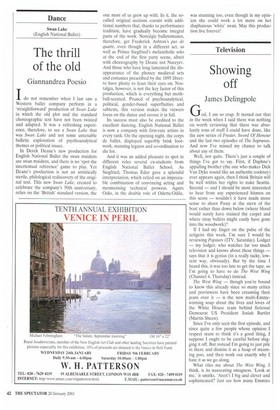Swan Lake (English National Ballet)
The thrill of the old
Giannandrea Poesio
Ido not remember when I last saw a Western ballet company perform in a 'straightforward' production of Swan Lake in which the old plot and the standard choreographic text have not been twisted and adapted. It was a refreshing experience, therefore, to see a Swan Lake that was Swan Lake and not some untenable balletic exploration of psychoanalytical themes or political issues.
In Derek Deane's new production for English National Ballet the swan maidens are swan maidens, and there is no 'spot the intertextual reference' game to play. Yet Deane's production is not an artistically sterile, philological rediscovery of the original text. This new Swan Lake, created to celebrate the company's 50th anniversary, relies on the 'British' standard version, the one most of us grew up with. In it, the socalled original sections coexist with additional numbers that, thanks to performance tradition, have gradually become integral parts of the work. Nostalgic balletomanes, therefore, get Frederick Ashton's pas de quatre, even though in a different act, as well as Prince Siegfried's melancholic solo at the end of the first party scene, albeit with choreography by Deane not Nureyev. And those who have long lamented the disappearance of the phoney medieval sets and costumes prescribed by the 1895 libretto have plenty to feast their eyes on. Nostalgia, however, is not the key factor of this production, which is everything but mothball-scented. Pruned of psychoanalytical, political, gender-based superfluities and subtexts, this version makes the viewers focus on the dance and savour it in full.
Its success must also be credited to the excellent dancing. English National Ballet is now a company with first-rate artists in every rank. On the opening night, the corps de ballet, displayed superbly brisk footwork, stunning legatos and co-ordination to die for.
And it was an added pleasure to spot in different roles several ex-students from English National Ballet School. As Siegfried, Thomas Edur gave a splendid interpretation, which relied on an impeccable combination of convincing acting and mesmerising technical prowess. Agnes Oaks, in the double role of Odette/Odile, was stunning too, even though in my opinion she could work a lot more on her diaphanous 'white' swan. May this production live forever!






























































 Previous page
Previous page